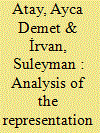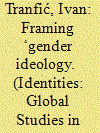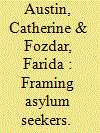|
|
|
Sort Order |
|
|
|
Items / Page
|
|
|
|
|
|
|
| Srl | Item |
| 1 |
ID:
178601


|
|
|
|
|
| Summary/Abstract |
This study assesses the representation of the so-called ‘Solution Process’ between the Turkish state and the insurgent armed organization Kurdistan Workers’ Party within the theoretical frameworks of peace journalism, indexing hypothesis, and Hallin and Mancini's media systems theory. The research comprises a frame analysis of the front page coverage of the ‘Solution Process’ in eleven Turkish newspapers in 2013, which is conducted on a total of 561 news stories. The results show that the Turkish press, with the exception of nationalist newspapers, supported the peace process in the selected time period. However, this peace-supportive approach cannot be attributed to peace journalism because the pro-peace attitude of the news media did not result from an independent journalistic initiative. Therefore, we refer to this type of journalism as ‘state-imposed peace journalism’.
|
|
|
|
|
|
|
|
|
|
|
|
|
|
|
|
| 2 |
ID:
185906


|
|
|
|
|
| Summary/Abstract |
This paper explores the role of the Catholic Church in the articulation of populist discourse. By analysing the frames in Catholic doctrines and their dissemination by the Croatian clergy, I make three contributions. Firstly, in contrast to research on the populist radical right, which demonstrates the manipulation of religion committed by secular actors, I identify the Church as an influential source and producer of the populist master frame. Secondly, I demonstrate how the bridging of the ‘gender ideology’ frame to this populist master frame allows the national Church to articulate traditionalist stances on morality policies. Thirdly, I identify the local-level argumentation strategies, empowered by frame bridging with anti-communist, nationalist, and sovereignist themes typical of radical-right populism. Focusing on religious actors’ agency allows us to improve theories rooted in the secular world of populist politics that neglect churches as important sources of populist discourse and mobilisation.
|
|
|
|
|
|
|
|
|
|
|
|
|
|
|
|
| 3 |
ID:
160441


|
|
|
|
|
| Summary/Abstract |
Dilemmas around how to deal with asylum seekers who arrive in Australia by boat have been a key driver of political and public discourse for over a decade. In 2012, an ‘Expert Panel on Asylum Seekers’ was established to provide advice to the Australian government about how to deal with the increasingly embarrassing issue of asylum seekers drowning at sea and a parliamentary stalemate on the matter. Using frame analysis to understand how national and post-national identities are being recruited in this debate, this paper analyses submissions to the Panel. We demonstrate how arguments for and against asylum seekers are constructed around nationalism, regionalism and globalism (cosmopolitan). Australia was variously framed as having an alternative national character from that promoted by politicians, as having a key regional role, and hence identity, and as a global citizen (both in reality and in appearance). Contrary to expectations, we found that each frame served as a vehicle through which progressive arguments were articulated, indicating the utility of each in arguing for more humane treatment of ‘Others’.
|
|
|
|
|
|
|
|
|
|
|
|
|
|
|
|
| 4 |
ID:
174555


|
|
|
|
|
| Summary/Abstract |
Hezbollah is a holistic network whose social, political, military and cultural dimensions are all parts of a discourse of resistance. Conducting a qualitative frame analysis of speeches by Hezbollah’s General Secretary Nasrallah, supported by interviews with Hezbollah leadership privy to its ideology, this study analyses the construction of muqawama (resistance). It argues that resistance is a complex social phenomenon, which can be manifested, for example, in the differences in how resistance is framed in varying contexts, often addressing different audiences. However, three unifying themes emerged from the frame analysis: diversity of resistance, normalisation of resistance and social dimensions of resistance.
|
|
|
|
|
|
|
|
|
|
|
|
|
|
|
|
|
|
|
|
|